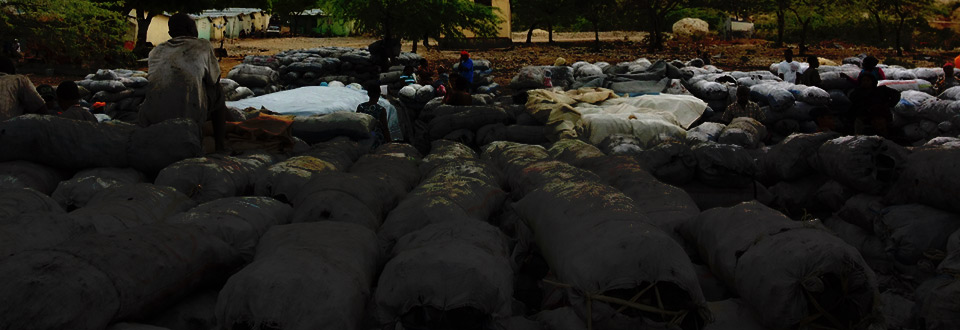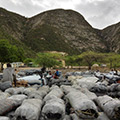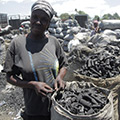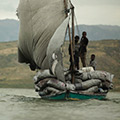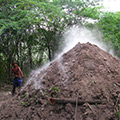Otter 501
Friday, September 6th at 10:00 AM Santo Domingo, FUNGLODE
Topic of panel:
Why Save Endangered Species?
Say “cheese” mother earth! - Nature Photography
Friday, September 6th at 4:00 pm Santo Domingo, FUNGLODE
Go Wild with GoPro!
Saturday, September 7th at 4:00 pm Santo Domingo, FUNGLODE
Globo Verde Dominicano Award
Saturday, September 7 at 8 PM Santo Domingo, FUNGLODE
Topic of panel:
Environmental film: An Effective Tool for Eco Education
Death by a Thousand Cuts
Original Title: Death by a Thousand Cuts
Country of Origin: Dominican Republic
Year of completion: In process
Duration: 18 min.
Format: MP4
Language: Spanish, Creole and English
Subtitles: English
Film Credits:
Director/Writer: Juan Mejia Botero and Jake Kheel
Producers: Ben Selkow, Jake Kheel, Juan Yepes
Cinematography: Juan Carlos Casteneda
Editor: Human Pictures
Film Synopsis:
In January 2012, Eligio Vargas, known as “Melanio,” a Dominican Park Ranger, was allegedly murdered by a Haitian charcoal producer, Pablo Tipal. While on patrol, Melanio was surprised by a group of people illegally making charcoal in the Sierra de Bahoruco National Park. It was a brutal murder; Melanio’s body was dismembered by a machete.
The murder provides a timely metaphor for the larger story of increasing tensions between Haiti and the Dominican Republic over illicit charcoal exploitation, as well as the emerging struggle over rapidly depleting natural resources leading to larger human conflict around the world.
Death by a Thousand Cuts explores the changing reality of communities along the Dominican-Haitian border, illustrating how deforestation cuts across the economic and social fabric of both countries with far-reaching consequences, largely unrecognized in either nation. Haiti’s long history of charcoal consumption has resulted in its deforestation, and, in the eyes of Dominicans, it is the driving force behind the illegal exploitation of Dominican forests.
The island of Hispaniola, once covered by forests and today the most populous island in the Americas, is home to one of the most perturbing stories of deforestation on the planet. Less than 2% of Haiti's forests remain and although the Dominican Republic bolstered forest coverage by about 25%, it's remaining forests are highly threatened. Deforestation is a key contributor to climate change, destruction of biodiversity, destabilization of topsoil and contaminating the water tables. The toll of an eventual ecological disaster has urgent economic and political consequences: impoverishment, uncontrolled migration, disease and civil strife.
This documentary uncovers how the lives of Dominicans and Haitians along the border are enveloped in a complex web of relationships that reflect a mutual dependence on charcoal trafficking and the forest resources that produce the charcoal. As in most struggles for natural resources, the fight for survival leads to clashes between communities. These clashes come to reflect the struggle for resources at a national and global level, which when taken to extreme scenarios like in Rwanda, Darfur and Liberia, can lead to deadly consequences.
September 6th, 2013
7:00 PM
Punta Cana
Galerías PUNTACANA Village
September 7th, 2013
3:00 PM
Santo Domingo
Palacio del Cine, Ágora Mall: Sala 3
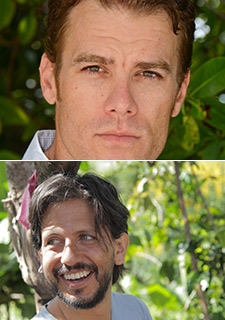
JAKE KHEEL, Co-Director, Producer:
For over 15 years, Jake has been intimately involved in the area of environmental protection in the Dominican Republic. Jake has directed research and educational programs all around the country, including the Sierra de Bahoruco where he did his Masters thesis as a student at Cornell University. It was also here that he developed a profound concern about the deforestation he was seeing along the border between Haiti and the Dominican Republic.
Jake has vast experience in managing interdisciplinary environmental projects, conducting media and public awareness campaigns as well as in community work. Currently Jake is the Environmental Director of the PUNTACANA Group and the not-for-profit PUNTACANA Ecological Foundation. His environmental protection work in Punta Cana has been widely documented both nationally and internationally. Both of the organizations he heads have won numerous awards and praise under his leadership as environmental administrator. Jake has a Masters degree in Environmental Administration from Cornell University and an undergrad degree in Spanish and Latin American Literature from Wesleyan University.
JUAN MEJIA BOTERO, Co-Director/Second Camera:
Juan Mejía Botero is an award winning film director with more than a decade of experience working in short and feature length documentaries. His focus is community, grassroots media and collaborative documentaries.
Juan, from Bogota, Colombia, immigrated to the United States where he earned a degree in Anthropology and Sociology from Swarthmore College, a Masters degree in Latin American Studies at Texas University and another Masters in Social Documentaries from the University of California, Santa Cruz.
As a Thomas J. Watson Fellow, Juan traveled, lived and worked as a facilitator of community video in Colombia, Brazil, Peru, Chile and Ecuador. His documentaries are profoundly influenced by his collaboration with grassroots organizations throughout the regions where he has worked.
His debut as a director was the documentary, Uprooted, that tells the story of an Afro-Colombian family displaced along the Pacific Coast of Colombia. The film, which won various prizes, was shown in festivals in the United States and internationally then later broadcast on PBS.
Juan has directed several short and longer documentaries on such issues as forced displacement, ethnic autonomy, state-sponsored violence, natural resources and other human right issues. His films have been widely viewed in festivals and on television. His most recent feature length documentary The Battle for Land won a production grant from the Ministry of Culture, the Colombia Fund for Cinema and a post-production grant from the Tribeca Film Institute. It is expected to be finished in 2013.
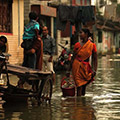 A Thirsty World
A Thirsty World Dr. Seuss' The Lorax
Dr. Seuss' The Lorax Harmony
Harmony Keep on Rolling: The Dream of the Automobile
Keep on Rolling: The Dream of the Automobile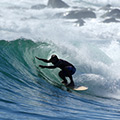 Minds in the Water
Minds in the Water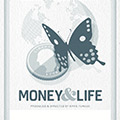 Money and Life – A Story about Money That Will Change your Life
Money and Life – A Story about Money That Will Change your Life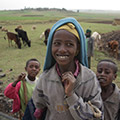 Mother: Caring for 7 Billion
Mother: Caring for 7 Billion Otter 501
Otter 501 Pad Yatra: A Green Odyssey
Pad Yatra: A Green Odyssey Planet Ocean
Planet Ocean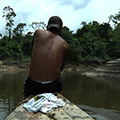 Sacred Science
Sacred Science Sharkwater
Sharkwater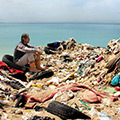 Trashed
Trashed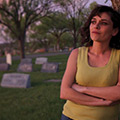 Uranium Drive In
Uranium Drive In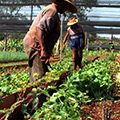 Voices of Transition
Voices of Transition
Films
This year’s 5 themes - oceans, biodiversity, green economy, sustainable agriculture and climate change,
will be covered in a selection of 30 films:


